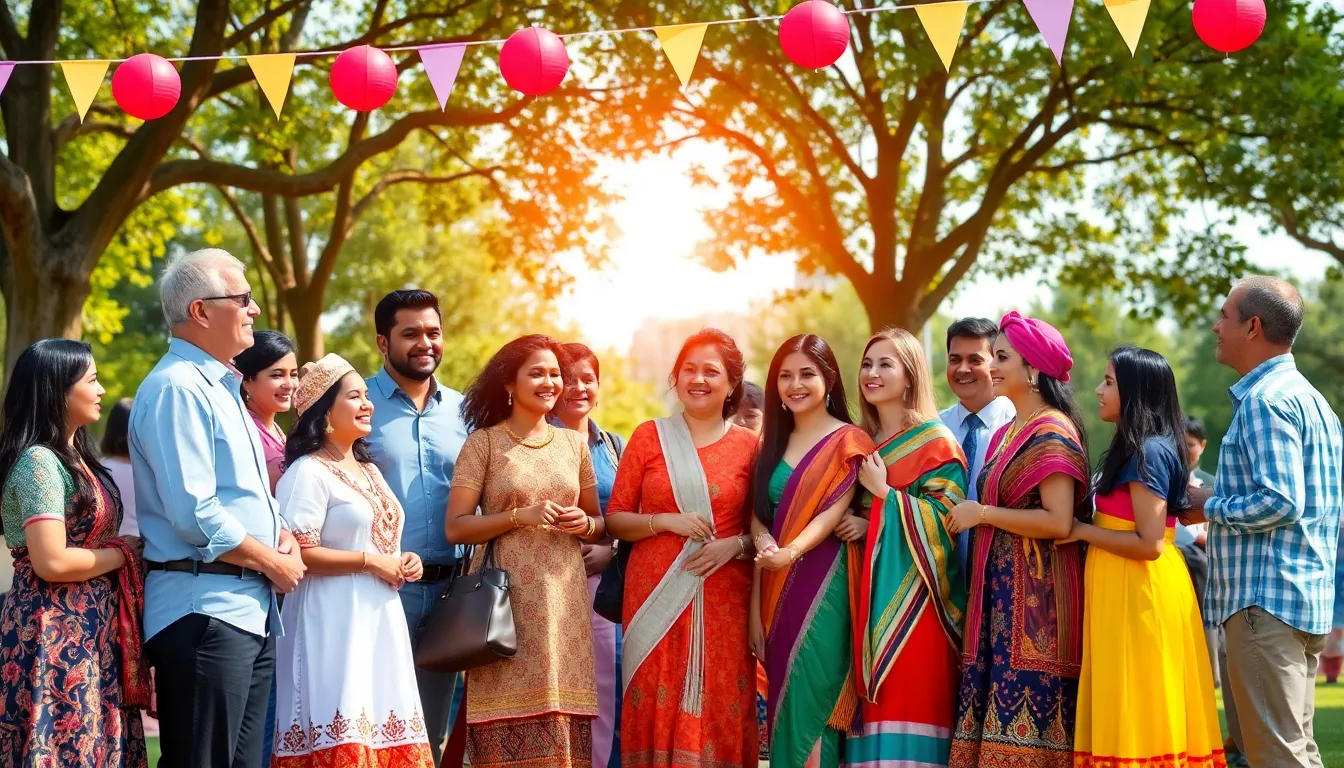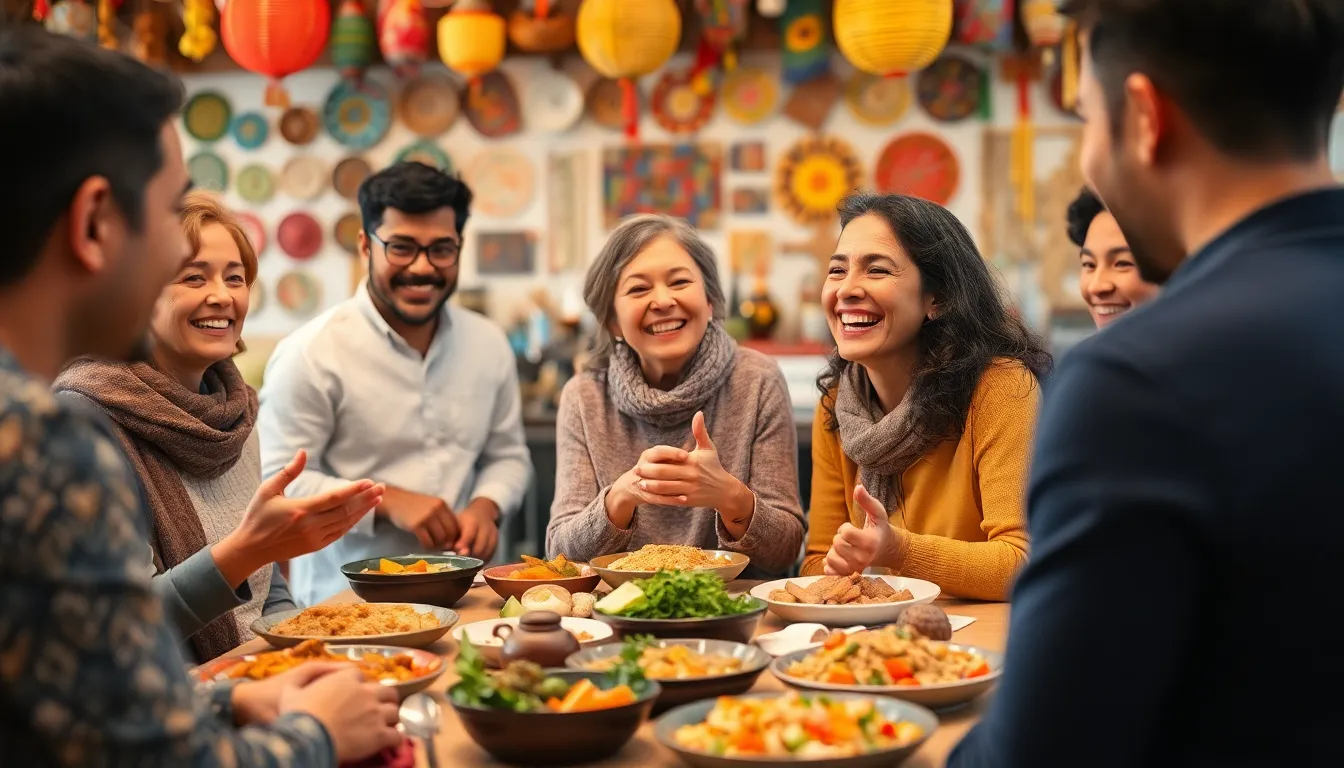Table of Contents
ToggleIn a world bursting with vibrant cultures and unique traditions, the concept of cultural universals might just be the glue holding humanity together. Think of it as the ultimate cultural buffet where everyone can find something they love—whether it’s the joy of storytelling or the universal language of laughter.
Understanding Cultural Universals
Cultural universals connect diverse cultures through common experiences and practices. These shared elements help foster understanding among people from different backgrounds.
Definition of Cultural Universals
Cultural universals refer to social practices, values, and norms that exist across various societies. Examples include family structures, language usage, and religious beliefs. These elements may vary in form but share a fundamental purpose within cultures. Recognizing these universals aids in comprehending human behavior on a global scale. Scholars often examine cultural universals to identify similarities that unite individuals regardless of their cultural context.
Importance of Cultural Universals
Cultural universals play a crucial role in promoting social cohesion. They provide a foundation for shared understanding and mutual respect among people. Such universals facilitate communication and collaboration, regardless of cultural differences. Additionally, they contribute to stability within societies by establishing common ground. The recognition of these shared elements can bridge gaps, fostering inclusivity in multicultural environments. Awareness of cultural universals supports effective intercultural dialogues, enhancing global connections.
Examples of Cultural Universals

Cultural universals manifest in various forms across societies, reflecting shared human experiences. These examples illustrate the common threads that bind diverse cultures together.
Language and Communication
Language serves as a primary means for people to convey thoughts and emotions. It exists in numerous forms, such as spoken, written, and signed languages. Communication styles differ among cultures, yet, the purpose of fostering understanding remains a constant. Non-verbal communication, like gestures and facial expressions, also transcends linguistic barriers. Shared symbols and meanings often emerge in various cultural contexts, aiding interpersonal connections.
Family Structures
Family structures appear in many shapes, including nuclear and extended families. These arrangements provide support, stability, and socialization for individuals. Across cultures, familial roles often include caregivers, providers, and protectors. Members typically share responsibilities, which may vary significantly from one society to another. Cultures express love and care through unique rituals and practices, reinforcing the importance of family ties.
Rituals and Beliefs
Rituals and beliefs play a crucial role in cultural expression. They encompass practices such as weddings, funerals, and religious ceremonies, creating a sense of belonging. Common themes, like the celebration of life cycles, emerge across cultures, offering comfort and meaning. Religions provide frameworks for moral values and ethical behavior, influencing social norms. People participate in these rituals to reinforce connections to both their communities and their spiritual beliefs.
Theories Behind Cultural Universals
Cultural universals emerge from various theoretical perspectives, providing insights into shared human experiences across societies.
Anthropological Perspectives
Anthropologists assert that cultural universals develop from adaptive responses to similar challenges. Humans create practices related to survival, family, and social organization. Studies show that kinship systems exist universally, though their structures vary. Furthermore, rituals, such as funeral practices or coming-of-age ceremonies, manifest across cultures. These similarities underscore fundamental human needs, highlighting a shared understanding of existence.
Psychological Insights
Psychological theories reveal that cultural universals arise from innate cognitive processes. Humans possess a need for social connection and communication, fostering similarities in language and expression. Psychological research indicates that emotions like happiness and grief manifest universally, despite differing cultural interpretations. Additionally, moral frameworks frequently align, suggesting shared ethical principles. Such insights support the notion that human psychology influences the formation of cultural practices, enhancing cross-cultural unity.
Cultural Universals in a Globalized World
Cultural universals play a significant role in connecting diverse societies in today’s globalized world. They facilitate communication and promote understanding among individuals from various backgrounds.
Impact of Globalization
Globalization accelerates the exchange of ideas and practices. This interconnectedness allows cultural universals to spread more rapidly across geographical boundaries. Shared experiences, such as music and cuisine, become more accessible, fostering deeper appreciation between cultures. Exposure to different family structures and belief systems enhances awareness, driving dialogue and collaboration. Research shows that technology further amplifies this impact, linking people globally in real time. Global cultures recognize patterns in storytelling and social rituals, inviting adaptations that enrich local traditions. Ultimately, globalization reinforces the presence of cultural universals, shaping global culture while respecting local identities.
Preservation of Cultural Universals
Preservation efforts maintain cultural universals amid rapid change. Institutions and communities often promote traditions through education and shared practices. Engaging in cultural heritage projects encourages continuity and pride in historical narratives. Local organizations frequently organize festivals highlighting universal themes, such as love and celebration. These events attract diverse participants, further solidifying the relevance of cultural traditions. Balancing innovation with preservation helps ensure that fundamental principles endure. As cultures share and celebrate their universal aspects, they carve out spaces for others to contribute, fostering mutual respect. This ongoing process of preservation strengthens ties among global communities, allowing for enriched intercultural exchanges.
Cultural universals serve as vital threads that weave together the fabric of human experience. They foster connections among diverse societies and promote understanding in an increasingly globalized world. By recognizing shared practices and values, individuals can engage in more meaningful dialogues and build stronger relationships across cultural divides.
The importance of preserving these universals cannot be overstated. As cultures evolve and adapt, maintaining a balance between innovation and tradition ensures that essential human connections remain intact. This ongoing commitment to cultural universals enriches lives and strengthens community bonds, ultimately enhancing the global tapestry of human experience.








